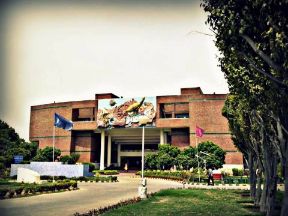|
Name
|
Description
|
|
Cement and Concrete Testing Laboratory
|
The Cement and Concrete Testing Laboratory is equipped to conduct a wide range of tests essential for evaluating the quality of cement, concrete, and associated materials. The lab facilitates practical understanding and skill development for students, ensuring their readiness for real-world construction quality control.
The equipment/laboratory setups available in the lab are: Cube casting moulds; Computerized Universal Testing Machine (UTM) (Capacity: 1000 kN); Compression Testing Machine (Capacity: 2000 tonne); Concrete tester; Compaction Factor Test apparatus; Concrete Flow Table; Slump Test Apparatus; Briquette Testing Machines; Air Permeability Apparatus; Vicat’s Needle Apparatus; Le-Chatelier Apparatus; Marsh Cone Apparatus; Cement Autoclave; Accelerated Curing Tank; Cement Testing Apparatus; Digital Hot Air Oven; Cement Tensile Testing Machine; Heat of Hydration Apparatus; Vee Bee Consistometer; Concrete Mixers; Water Bath; Mortar Mixer; Moisture Meter; Tile Abrasion Testing machine
|
|
Environmental Engineering Laboratory
|
The Environmental Engineering Laboratory is designed to provide students with hands-on training in water, wastewater, and air quality analysis. It supports advanced environmental monitoring and assessment using sophisticated instruments, enabling students to carry out applied research and field studies.
The equipment/laboratory setups available in the lab are: AAS, UV Vis Spectro- photo meter, BOD Incubator Shaker, Flocculator Alum Jar Test Apparatus, Laminar Airflow Cabinet, Turbidity Meter, Flame Photometer, Conductivity Meter, Dissolved Oxygen (DO) Meter, Air Samplers, Sound Level Meter, Muffle furnace, Automatic Absorption SpectroPhotometer, Ion Selective Electrode, COD Apparatus, Bacteriological Incubator, Laminar Air Flow cabinet, COD digester, High Volume sampler, BOD Incubators, Ion Analysers, multiparameter, SPM and RSPM analysers, Weather Monitoring Station, AtmoPro Sensor for ambient air quality monitoring, Aethalometer.
In addition, CPCB is in the process of installing an Air Quality Monitoring Station in the West Campus.
|
|
Fluid Mechanics and Hydraulic Mechanics Laboratory
|
The Fluid Mechanics and Hydraulic Mechanics Laboratory aims to provide an understanding of the principles of fluid behavior and hydraulic machinery. The lab allows students to practically verify theoretical fluid dynamics concepts and study flow measurement, hydraulic forces, and energy conversions.
The equipment/laboratory setups available in the lab are: Pipe friction apparatus, Venturi meter apparatus, Nozzle meter apparatus, Reynolds’ apparatus, Hydraulic Bench with Level Indicator, Bend Meter, Hydrology Apparatus, Impact of jet apparatus, Rota Meter, Free Vortex and Forced Vortex apparatus, Large tilting Experimental flumes, Pitot Tube Apparatus for Velocity Distribution, Impact of Jet Apparatus, Metacentric Height Apparatus, Centrifugal Pump Test rig
|
|
Transportation Engineering Laboratory
|
The Transportation Engineering Laboratory provides facilities to conduct standardized tests on highway materials, pavement evaluation, and traffic studies. The lab focuses on quality control, material testing, traffic data collection, and pavement design, equipping students with the essential knowledge to address transportation challenges.
The equipment/laboratory setups available in the lab are: Aggregate Impact Testing Machine, Los Angeles Abrasion Machine, California Bearing Ratio Test apparatus, Marshall Stability Testing Machine, Benkelman Beam Apparatus, Bump Integrator,, Softening Point Apparatus, Bitumen Centrifuge Extractor, Penetrometer apparatus; Viscometer
|
|
Geology and Building Material Laboratory
|
This laboratory focuses on the physical and mechanical properties of building materials and geological specimens. It ensures that the materials used in construction comply with modern standards and introduces students to mineral and rock identification as well as geological processes relevant to civil engineering.
The following test can be performed in the Geology and Building Materials lab: Water absorption, Efflorescence, Specific gravity, Rock and Minerals identification, Compressive strength, Flexural strength, Dimensional tolerance test, Hardness of brick
|
|
Soil Mechanics and Geotechnical Laboratory
|
The Geotechnical Engineering Laboratory is equipped with advanced setups for soll classification and strength characterization,. It plays a crucial role in preparing students and researchers to design foundations, pavements, embankments, and other geotechnical structures.
The equipment/laboratory setups available in the lab are: Unconfined Compressive test apparatus (UCS), Triaxial apparatus, Diffusion testing setups, Hydraulic conductivity test apparatus, Standard penetration test apparatus, Direct shear test apparatus, Proctor compaction apparatus, Sand pouring cylinder, Pycnometer, Consolidation test apparatus, Shrinkage limit apparatus, Liquid limit device, Liquid limit cone penetrometer, Plastic limit estimation apparatus, Sieve shaker (motorized), Hot air oven, Vane shear apparatus, Brass sieve 4.75 to 75 micron, Sampling kit, etc.
|
|
Strength of Material and Structure Design Laboratory
|
The Strength of Materials and Structural Design Laboratory enables students to understand the mechanical behavior of structural materials. Practical experiments help verify theoretical concepts such as stress-strain behavior, impact resistance, deflections, and stability of structures, which are fundamental for safe structural design.
The equipment/laboratory setups available in the lab are: Universal testing machine, compressive strength testing machine, Impact testing machine, Clerks Maxwell Reciprocal Beam Apparatus, Curved member apparatus, Elasticity coupled beam, Redundant Joint apparatus, Two Hinged arch, Three Hinged Arch, Unsymmetrical bending apparatus.
|
|
Surveying Laboratory
|
Surveying Laboratory offers training in modern surveying techniques and geospatial data collection. Students gain expertise in land surveying, mapping, and the use of digital and remote sensing instruments, preparing them for diverse applications in civil engineering projects.
The equipment/laboratory setups available in the lab are:
Electronic total stations, Micro-optic theodolites, Differential Geographical Positioning System, Auto levels, WILD T2 and T3 Theodolite, Stereoscope, Digital Theodolite, Tripods, Plane tables, Telescopic Alidade, Borton Compass, Chains, Tapes, Arrows Pegs, Dumpy levels, Digital levels, Plane tables, Engineers Compass, Mirror Stereoscope, Staff Stands, Ranging Rods, ranging rod stand, Curve Set, Substance Bar, Spanner set, Line Ranger, Optical Square, Indian Optical square, Box Sextant, Adjustable Cross Staff, Cross Staff, Indian Pattern Clinometer, Pentagraph, Spirit Level, Magnetic Needle, Pedometer, Abney Level, Alidade, parallax Bar, Staff Stands, Ranging Rod Stand, Theodolite, Total Station, Auto Level, Digital Planimeter,
Prismatic Compass
|
|



